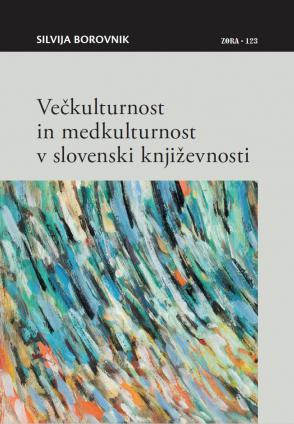Večkulturnost in medkulturnost v slovenski književnosti
Keywords:
Slovenian literature, Slovenian language, multiculturality, bilingualism, national identitySynopsis
Multiculturality and interculturality in Slovenian literature. An academic monograph by Associate Professor Dr. Silvija Borovnik, deals with issues of multiculturality and interculturality in contemporary and recent historical works of Slovenian literature. In the first and more analytical section of the monograph, Borovnik focuses on modern works of literature written by Drago Jančar and Aleš Debeljak. In their literary works, these two authors often described the historical formation of Slovenian identity as well as the intercultural contact between Slovenia and other nations and cultures, especially in the context of the European Union. Both Jančar and Debeljak were proponents of openness and respect for diversity. Borovnik then turns to images of interculturality in the literary works of Josip Osti, a Bosnian author who migrated to Slovenia during the Bosnian War, and eventually began to write in the Slovenian language. Borovnik takes a strong interest in dual literary and linguistic identities, which, in addition to Osti, is represented by the Slovenian-French writer Brina Svit and the American-Slovenian writer Erica Johnson Debeljak, as well as by Carinthian Slovenian authors Maja Haderlap and Florjan Lipuš, and by the Austrian writer Peter Handke, who is of Slovenian origin and whose recent work deals with issues of identity. In the chapter about Alma Karlin, a Slovenian native who wrote in German during the mid-20th century, Borovnik points out that the Slovenian literary space was bilingual for the majority of the 20th century and that the Slovenian literary canon should acknowledge the work of all Slovenians who wrote in foreign languages. Borovnik positively encourages all phenomena of this kind, emphasizing the cosmopolitan character of these authors and their dedication to developing respect for their own cultures and languages, as well for the cultures and languages of others. In the second part of the academic monograph, the author turns to the issue of the use of Slovenian as the language of instruction at Slovenian universities. She responds to the politicized demands for the replacement of Slovenian with English as the language of instruction in local lecture halls, a proposal she emphatically opposes. She argues that this trend is a result of the global neoliberal economy that sees the eradication of the Slovenian language as the idiom of science and profession, and gradually even as the idiom of everyday communication, as a means to increase global corporate profit. In accordance with the Florentine resolution, Borovnik argues that national languages and cultures should be preserved and nurtured since the use of English does not necessarily augment international acclaim or reputation. Borovnik extends her argument to communication in other European languages and promotes the ongoing translation in and out of Europe’s extremely rich national languages, Slovenian among them. Borovnik bases her arguments on her own experiences with multiculturality and multilingualism. Since the beginning of her career, she has spent many years studying or lecturing at foreign universities.
Downloads






